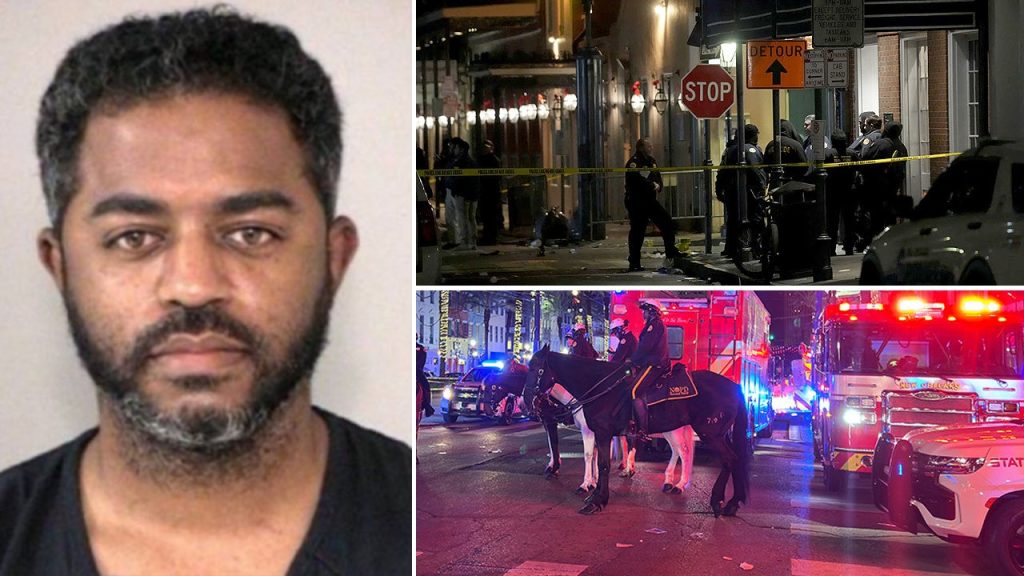A pair of suspected terrorist attacks on New Year’s Day were allegedly carried out by former U.S. service members, prompting concerns about how individuals with access to sensitive intelligence and advanced weapons can get involved in radical beliefs. The first attack occurred in New Orleans, where Texas resident and former Army staff sergeant Shamsud-Din Jabbar plowed into a crowd on Bourbon Street, killing 14. Meanwhile, in Las Vegas, a Tesla Cybertruck exploded outside the Trump hotel in what was believed to be a terror plot linked to Army Master Sgt. Matthew Livelsberger, who died in the attack. A study by the National Consortium for the Study of Terrorism and Responses to Terrorism revealed that from 1990 to 2022, 170 individuals with U.S. military backgrounds plotted 144 mass-casualty terrorist attacks in the United States.
The Department of Defense has remained silent in response to inquiries about its plans to identify and eliminate radicals within the military. Past cases of military radical extremists carrying out attacks on U.S. soil have raised red flags. In 2009, former Army Major Nidal Hassan killed 13 people in a mass shooting at Fort Hood Army base in Texas, with reports indicating his extremist views against the U.S. presence in Iraq and Afghanistan. Army Private Cole James Bridges was arrested in 2021 for conspiring to blow up the 9/11 memorial in New York and assisting ISIS in targeting U.S. soldiers, while Army Private Ethan Melzer was sentenced to 45 years in prison in 2020 for sharing military information with a neo-Nazi group to plan an attack on his unit.
Another case involved Frazier Glenn Miller, a lifelong White supremacist and Army veteran who killed three people in 2014 outside Jewish centers in Kansas. Despite his intentions to target Jews, Miller’s victims were Christians. Navy veteran Zale Thompson carried out a Salafi-jihadist-inspired hatchet attack in Queens, New York in 2014, injuring four police officers. He had been discharged from the Navy in 2003 after multiple arrests in domestic disputes. Micah Xavier Johnson, an Army reserve Afghanistan War veteran, killed five police officers in Dallas in 2016, in response to police shootings of Black men.
In 2020, three veterans identified as Boogaloo Bois were arrested in Las Vegas for conspiring to bomb a U.S. Forest Service building and a power substation during protests following the death of George Floyd. A total of 480 individuals with military backgrounds were accused of ideologically driven extremist crimes between 2017 and 2023, with 230 connected to the Jan. 6, 2021 Capitol riot. These incidents highlight the need to address radicalization within the military and implement measures to prevent individuals from carrying out violent attacks based on extremist beliefs. It remains crucial for authorities to identify and root out radicals within the military to safeguard national security and prevent further incidents of terrorism on U.S. soil.
The cases of military radical extremists who have conducted attacks on U.S. soil in the 21st century serve as cautionary tales of how individuals with military backgrounds can become involved in violent and extremist activities. Past instances such as the Fort Hood mass shooting in 2009, the attempted bombing of the 9/11 memorial in 2021, and the sharing of military information with neo-Nazi groups in 2020 underscore the importance of addressing radicalization within the military. The involvement of former service members like Frazier Glenn Miller, Zale Thompson, and Micah Xavier Johnson in violent incidents demonstrates the risks posed by individuals with military training and access to weaponry who adopt extremist ideologies.
Efforts to prevent radicalization within the military must be intensified to identify and intervene with individuals who may be susceptible to extremist beliefs and ideologies. The lack of response from the Department of Defense regarding plans to address radicals in the military raises concerns about the effectiveness of current measures in place. With the prevalence of military personnel engaging in acts of terrorism and violence, it is crucial for authorities to develop comprehensive strategies to combat radicalization, safeguard national security, and protect civilians from potential harm. The cases of individuals like Shamsud-Din Jabbar and Matthew Livelsberger underscore the urgent need for proactive measures to prevent radicalized service members from carrying out acts of terror on U.S. soil and endangering the lives of innocent civilians.


